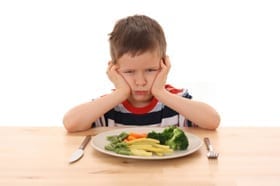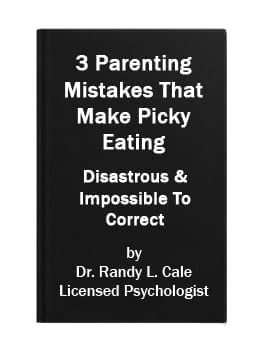 One of the most frequent questions that I receive concerns the difficulties parents have with their children around food. This is a critical issue to resolve, as the parent-child struggles, that often develop into battles over food, provide the foundation for future eating disorders.
One of the most frequent questions that I receive concerns the difficulties parents have with their children around food. This is a critical issue to resolve, as the parent-child struggles, that often develop into battles over food, provide the foundation for future eating disorders.
Here I will outline a series of simple, yet concrete steps that you can take to eliminate struggles over food.
Why Battles Over Food Are Harmful!
Here is a scenario I hear quite often:
Mom is worried because Jennifer often picks at her food and rarely eats everything on her plate. Jennifer is thin for her age, and Mom consistently encourages Jennifer to eat more.
Because she is concerned, perhaps Mom buys lots of high calorie snacks and treats and makes these available to Jennifer.
 Jennifer grows more and more fond of these types of foods, and consistently rejects or refuses to eat healthy food. As Jennifer gets older, she becomes more and more resistant to eating healthy foods. The more she resists; the more Mom and Dad apply pressure. Jennifer still looks thin. Now both parents begin to apply more punitive strategies, when they insist to Jennifer that she will eat her food, and sometimes engage in an hour-long standoff.
Jennifer grows more and more fond of these types of foods, and consistently rejects or refuses to eat healthy food. As Jennifer gets older, she becomes more and more resistant to eating healthy foods. The more she resists; the more Mom and Dad apply pressure. Jennifer still looks thin. Now both parents begin to apply more punitive strategies, when they insist to Jennifer that she will eat her food, and sometimes engage in an hour-long standoff.
As Jennifer gets older, the daily struggles become tiring. Both Jennifer and her parents are sick of the battle, yet it seems that they are locked in this daily dialog. Jennifer’s range of acceptable foods grows narrower and narrower and her reliance upon unhealthy, junk foods increases.
While this is a typical scenario, there are many variations of this. The most problematic of situations can evolve into somewhat terrifying situations, where children display eating disorders, such as anorexia and bulimia.
Both theory and research strongly support the role that family dynamics play in the development of eating disorders. There are almost always power struggles that evolve around food and the consumption of food. At minimum, tremendous amounts of parental energy is devoted to what is or is not eaten.
These power struggles unintentionally teach children that food takes on an “unnatural” level of importance in their life. Rather than meals simply becoming the routine consumption of nutritious, healthy food, they become a battleground where parents and children assert their sense of power and authority.
While it is relatively rare that these situations actually evolve into a fully diagnosable, clinical eating disorder, there are many situations where children develop exceptionally picky eating habits that are unnecessary and unhealthy.
The good news is that picky eating habits can be easily resolved. The specific steps that are outlined below can be extraordinarily helpful.
However, they may require you to adjust your mental attitude and your beliefs about your role in supporting healthy eating habits.
How To Help The Picky Eater
1. Adjust your mindset.
To expand the foods your child eats, it is essential to let go of the idea that you can (or should) force or demand your kids to eat healthy food.This is not to say that you relinquish this goal. It simply acknowledges that forcing or demanding your children to eat healthier will not work.Instead, you can arrange your home environment and structure activities in the home so that you gently and consistently encourage the growth of healthy eating habits.How do you do this?
2. Start out by cleaning out your pantry.
Get rid of all the junk food, sodas, potato chips, ice cream, candy bars, etc. Simply do not have these foods in your house as an option, and, instead, substitute healthy alternatives. This will obviously include an abundance of fruits and vegetables.
3. Prepare healthy meals with a variety of foods.
 After you prepare a meal, let the kids know that this is the meal for the evening. There will be no additions or changes, depending on the preferences of anyone in the family. As many of my clients have expressed, “My kids seem to think that I am a short-order cook in a restaurant.”
After you prepare a meal, let the kids know that this is the meal for the evening. There will be no additions or changes, depending on the preferences of anyone in the family. As many of my clients have expressed, “My kids seem to think that I am a short-order cook in a restaurant.”
4. If any of the children refuse to eat the nutritious meal that you made for them, simply do not resist their refusal.
Instead, let them know that they do not have to eat what is on their plate or eat their meal. Also let them know that there will be no snacks, no treats available, and certainly no access to dessert, if this is an option after dinner.
5. When actually sitting at the table, if children complain and pick at their food, do not engage them in any fashion during these times.
Instead, engage with someone else at the table, simply ignoring their complaints and criticisms of the food. When your child begins to talk without complaint, or begins eating, engage and talk to them freely.
6. If children complain or resist eating the healthy food, use this very simple formula for communicating with them:
“You have a choice. You don’t have to eat your food, and you can complain about the meal, and you are certainly free to leave the table hungry and to go to bed hungry. Or you could choose to eat this healthy meal, that I have provided for you, and you will go to bed feeling full and satisfied. It’s up to you.”From this point on, continue to ignore their complaint, if they persist.
7. Notice that it is essential not to get into a situation where you worry about the children going to bed without dinner.
 They will readily survive an occasional night here and there without an evening meal.You must trust that the natural learning processes of nature will begin to take hold in the weeks ahead. When your children learn that there will be no fights over food and that no other options are available after dinner, the hunger that they experience eventually becomes a powerful teacher and instructor. They will learn to eat what is offered MOST of the time. Simply don’t sweat the other times, as they will grow fewer and farther apart.
They will readily survive an occasional night here and there without an evening meal.You must trust that the natural learning processes of nature will begin to take hold in the weeks ahead. When your children learn that there will be no fights over food and that no other options are available after dinner, the hunger that they experience eventually becomes a powerful teacher and instructor. They will learn to eat what is offered MOST of the time. Simply don’t sweat the other times, as they will grow fewer and farther apart.
In fact, it is essential that you allow this natural process to unfold. Parents typically interfere and worsen these situations by either engaging in arguments or battles over food, or allowing children the option of eating high-calorie, unhealthy junk food at a later point. Either of these options will undermine the natural process of your child learning to expand interest in a wide range of food.
Notice that there are three essential ingredients to this plan. They are:
 Eliminate the options for children to have access to junk food;
Eliminate the options for children to have access to junk food;
Eliminate any and all efforts to coerce, force, cajole, convince, or in any way strongly encourage children to eat more than what they want to eat;
Be willing to allow children to experience hunger when they have walked away from healthy food on the table. This is the natural consequence that will allow them to learn to eat healthier next time.
In closing, the picky eating habits of children are almost always a by-product of parental concerns about children’s eating habits. We feel they should drink more milk or eat more of a particular type of food, and thus try to convince our children to consume more of these items. Yet, if we look at the history, we will inevitably discover that this does not work. In fact, if we look at it honestly, we clearly discover that these efforts only serve to make the situation worse.
In the event that your child is slightly thin, I would encourage you to make one critical notation. Research has consistently and repeatedly proven that the one factor that will significantly predict longevity is the life-long tendency to maintain slightly below-average body weight. This finding has been consistent across cultures, as well as across the human species and other animal species.
Bottom line: Children who tend to eat less and remain on the thin side (i.e., approximately 10% under average for their size) will be healthier and will likely live a longer life. (This is not the same as a child who simply refuses to eat, or purges after eating.)
If we can relinquish our worries about kids who are a bit thin and follow the guidelines outlined above, children will learn to eat healthy foods that provide a balanced nutritional experience. They will also not experience a world where food takes on an excessive level of importance.
Healthy eaters tend to think of food as a source of energy and vitality and focus relatively little attention toward food when not eating.
If you have a picky eater in your home, and you want a fool-proof system to get them on track, consider the Help The Picky Eater program. In that program, I expand upon these basic principles and walk you through every detail to get your kids on track to healthy eating. Click here to learn more about this program:
As a reminder, the guidelines outlined here will eliminate and reduce symptoms of picky eating. If your son or daughter is exhibiting more serious symptoms consistent with a possible eating disorder, it is imperative that you obtain a professional evaluation and possible intervention.

 ** Please double check for accuracy. Your privacy is SAFE. We will NEVER sell/rent/give away your information.
** Please double check for accuracy. Your privacy is SAFE. We will NEVER sell/rent/give away your information.













